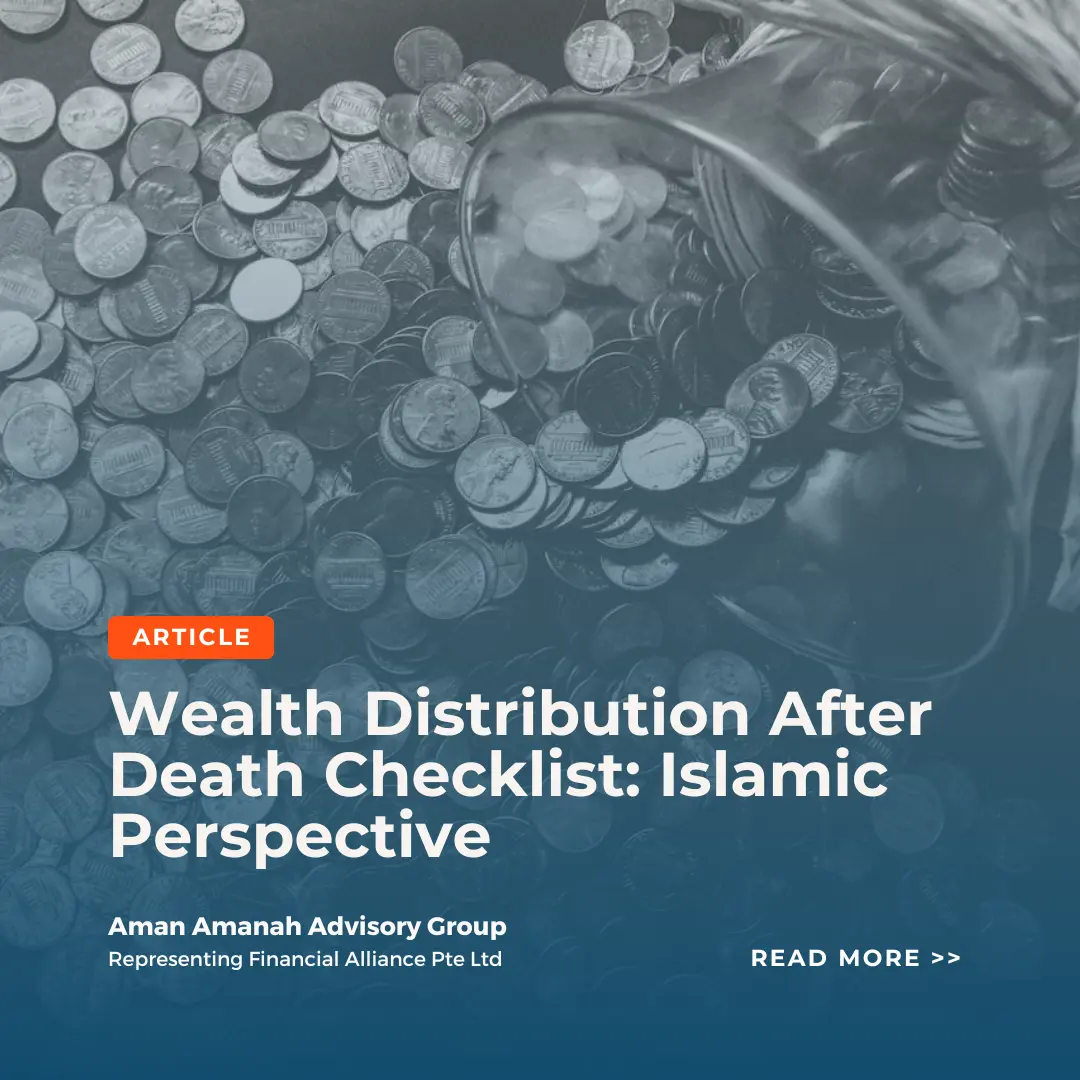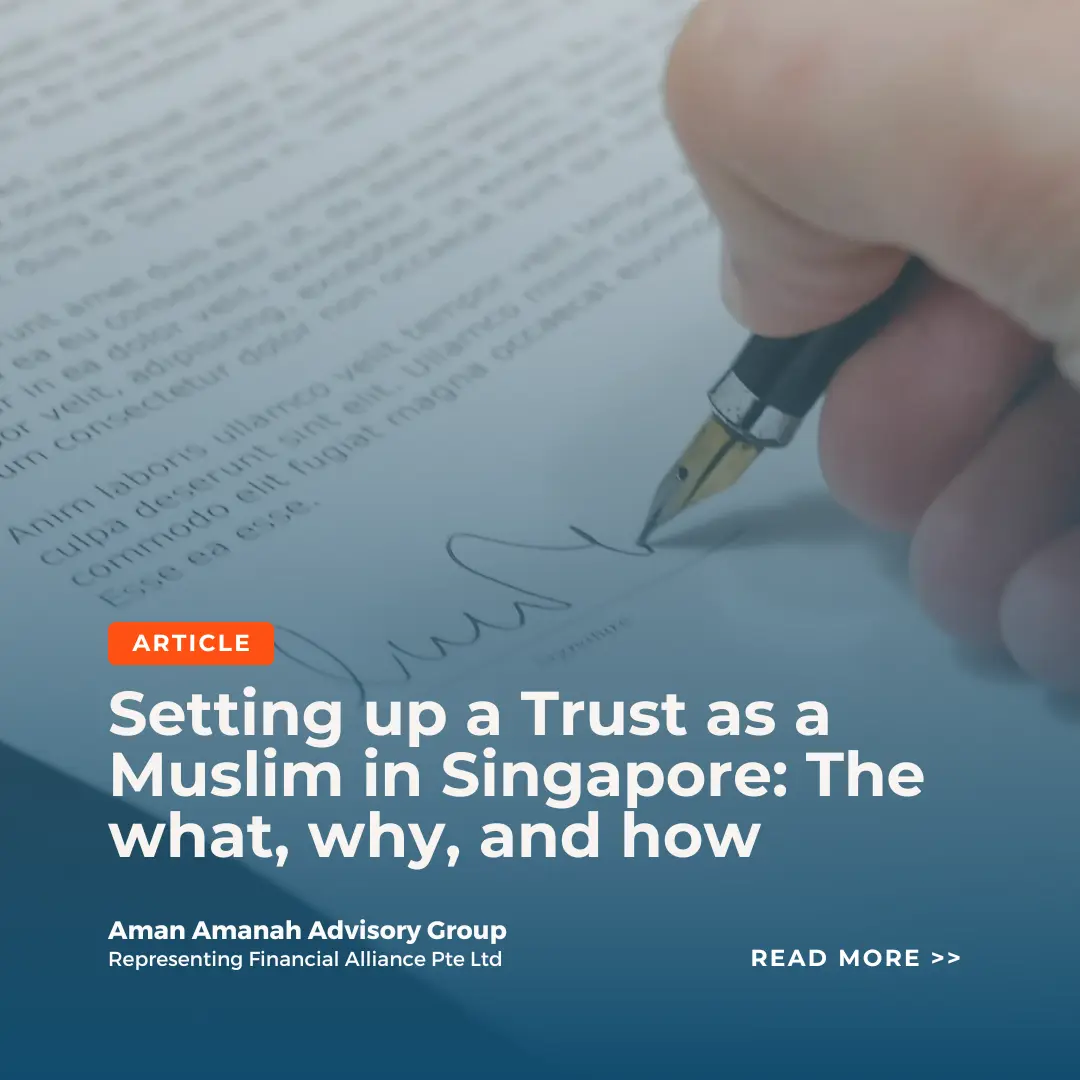Planning for the distribution of wealth after death is a significant aspect of Islamic teachings. Muslims follow a structured system to ensure that wealth is divided justly among heirs and beneficiaries. This system is guided by Faraid, Islamic inheritance law, but there are other tools such as Wasiat (will), Hiba (gift), and Nuzriyyah (vow) that Muslims can also use. This article will guide you through the key points to consider when dealing with wealth distribution after the passing of a Muslim individual.
Here’s a quick overview of what you’ll be reading:
- What is Faraid
- Who are the beneficiaries under faraid
- If you can use a will without faraid
- When is Faraid applied
- What is wasiat
- What is Hiba
- What is Nuzriyah
- Checklist on what to do when someone passes away
What is Faraid?
According to the Islamic Religious Council of Singapore (MUIS), Faraid is Islamic inheritance law that governs the distribution of a deceased Muslim’s assets. It determines the heirs and their respective shares based on guidance from the Quran and Hadith. Faraid applies by default to all the deceased’s assets unless prior arrangements such as a will (Wasiat) or a vow (Nuzriyyah) have been made.
Who Are the Beneficiaries Under Faraid?
Faraid divides beneficiaries into two main groups:
1. Quranic Heirs
These are the individuals whose shares are explicitly mentioned in the Quran. There are 12 Quranic heirs:
- Husband
- Wife
- Mother
- Grandfather
- Grandmother
- Daughter
- Son’s Daughter
- Full Sister
- Consanguine Sister (same father, different mother)
- Uterine Sister (same mother, different father)
- Uterine Brother (same mother, different father)
Each Quranic heir is entitled to a fixed portion of the estate as determined by the Quran.
2. Residual Beneficiaries
These individuals inherit the remaining assets after the Quranic heirs have received their shares. They are usually closer family members like sons or daughters who take the remaining estate.
Must Faraid Be Used? Can I Just Use a Will?
Faraid is mandatory in Islam, but Muslims have some flexibility. While Faraid ensures that the wealth is distributed justly among family members, a person may also leave a Wasiat (will) for up to 1/3 of their estate to non-Faraid beneficiaries (e.g., friends or charity). However, the Wasiat cannot override the Faraid system for more than 1/3 of the estate, and the remaining 2/3 must follow Faraid.
When is Faraid Applied?
Faraid comes into play after someone passes away. Before applying Faraid, any wishes expressed through Wasiat and Nuzriyyah are considered. If there are no Wasiat or Nuzriyyah, the estate will be distributed entirely according to Faraid.
To calculate Faraid shares for a specific estate, MUIS provides a Faraid Calculator, which can help families determine how assets will be distributed. You can access it here: https://syariahcourt.gov.sg/Inheritance/Online-Trial-inheritance-Calculator.
What is Wasiat (Will)?
A Wasiat is a legal document written by a Muslim during their lifetime to express how they wish part of their estate to be distributed upon their death. According to MUIS, a person can distribute up to 1/3 of their estate through a Wasiat, and the beneficiaries can be anyone who is not already a Faraid heir. This allows Muslims to contribute to causes or individuals outside of their immediate family. In addition to that, a wasiat specifies the executor(the person to settle deceased estate) and guardian(if the deceased leaves behind minor children).
What is Hiba (Gift)?
A Hiba is a gift given during a person’s lifetime. This could be in the form of cash, property, or any other valuable item. Once given, a Hiba is immediately transferred to the recipient and is not considered part of the estate after the giver’s death.
What is Nuzriyyah?
Nuzriyyah involves making a Nazar, which is a vow to perform a certain action if specific conditions are met. For instance, a person may vow, “3 days before I pass away, I vow to donate [insert amount of money] to [insert organisation to give].” This vow must be recorded in writing, signed, and witnessed by two males of sound mind, and it takes effect 3 days before the person’s death.
Steps to Take After Someone Passes Away
- Settle the burial of the deceased according to Islamic rites.
- Obtain the death certificate from the appropriate authorities such as the hospital, National Environment Agency (NEA), or Ministry of Home Affairs.
- Get an inheritance certificate from the Syariah Court.
- Identify the assets of the deceased, including savings, CPF, property, insurance, and investments.
- Apply for a Grant of Letter of Administration (GLA) or Probate if necessary.
- Liquidate the assets and retrieve funds from the bank or other institutions.
- Settle any debts that the deceased owed.
- Settle Zakat, Kafarah (penalties), and any other religious obligations the deceased may have missed.
- Disburse the funds according to Faraid, Wasiat, Nuzriyyah, or any other applicable instructions. If there are no legal heirs, the remainder of the estate will go to the Baitulmal (public treasury for charity purposes).
Conclusion
Islamic inheritance law (Faraid) provides a clear and structured way to distribute wealth after death. However, Muslims also have the flexibility to use tools like Wasiat, Hiba, and Nuzriyyah to allocate part of their wealth as they wish. It’s essential to understand how these tools work together to ensure that your wealth is distributed according to Islamic principles while also considering personal wishes.



